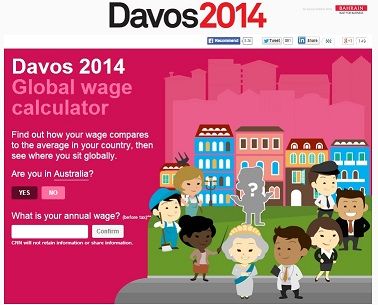Wage growth in Australia is low, according to the Australian Bureau of Statistics. So how does your salary compare?
According to the Australian Bureau of Statistics (ABS) seasonally adjusted wage growth in Australia was just 0.4% in the September quarter 2016, bringing the yearly figure to just 1.9% – a new record low for the series.
According to the analysis, the average frequency and the average size of wage changes have both fallen since 2012, thanks in part to a significant decline in the number of “large (+4%) wage increases being seen across the economy.
Aerage Weekly Earnings in Australia are currently as follows:
| Original figures | May 2016 $ | 12 month % change |
|---|---|---|
| Full-time adult average weekly ordinary time earnings | 1 516.00 | 2.2 |
| Full-time adult average weekly total earnings | 1 573.30 | 2.1 |
| All employees average weekly total earnings | 1 160.90 | 2.1 |
Source: ABS Average Weekly Earnings, Australia
Australia’s latest gender equality scorecard
If you’re feeling hard donre by in terms of salary, you may be more likely ot be female, with the latest gender equality scorecard, released by the Workplace Gender Equality Agency (WGEA), finding that women make up half of the nation’s workforce but earn only 77% of men’s average full-time income – approximately $27,000 per year less.
The new data shows the average full-time female employee took home $26,853 less than the average male employee in 2015-16, with the salary difference rising to $93,884 at the top level of management.
Women are also under-represented in leadership roles: holding just 16.3% of CEO and 37.4% of all manager roles.
Today @WGEAgency releases their new data set, it’s amazing.
This pyramid of slow decline for women shows reality of workplace opportunity. pic.twitter.com/bHacTia0M5
— Conrad Liveris (@ConradLiveris) November 15, 2016
How does your industry compare on earnings?
According to the ABS data, those employed in the mining industry still have the highest average weekly ordinary time earnings, with daylight between mining and every other industry.
Financial and insurance services was ranked second, with information media and telecommunications, electricity, gas, water and waste services and professional, scientific and technical services all close together.
Source(s): Average Weekly Earnings, Australia
Australian salaries compared to the world
 This little calculator is a couple of years old now, but it’s cute nevertheless. This nifty little online tool from CNN enables you to work out exactly where you stand in the world economy.
This little calculator is a couple of years old now, but it’s cute nevertheless. This nifty little online tool from CNN enables you to work out exactly where you stand in the world economy.
Simply tap in your annual salary (before tax) and it calculates what percentage of your country’s average annual wage you earn, as well as the percentage of the global average annual wage. It also compares your salary with various different workers around the world, meaning you can work out how close your earnings are to a health professional in Greece, a cleaner in Thailand, or even the Queen of England!
Satirical US journalist H.L. Mencken had a saying: “A wealthy man is one who earns $100 a year more than his wife’s sister’s husband.”
We all like to feel wealthy, and using the Global wage calculator, just about anyone can. Think your salary is pretty paltry at $35,000 a year? Fret not – you’re considerably higher up the pay scale than Ethiopia’s hard-working teachers, who earn just a tenth of that. On the other hand, want to know how much you’d need to be making in order to rival a CEO in the US? (If you don’t, look away now – it’s a whopping $273,000!







Share this article